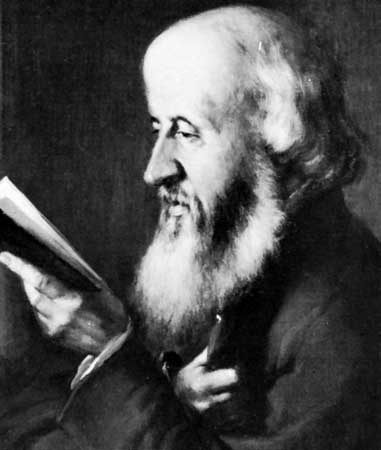Barnes, William
English poet
born Feb. 22, 1801, Bagber, near Sturminster Newton, Dorsetshire, Eng.
died Oct. 7, 1886, Winterbourne Came, Dorsetshire
 English dialect poet whose work gives a vivid picture of the life and labour of rural southwestern England and includes some moving expressions of loss and grief, such as "The Wife A-Lost" and "Woak Hill." He was also a gifted philologist, and his linguistic theories as well as his poetry influenced two major writers, Thomas Hardy (Hardy, Thomas) and Gerard Manley Hopkins (Hopkins, Gerard Manley).
English dialect poet whose work gives a vivid picture of the life and labour of rural southwestern England and includes some moving expressions of loss and grief, such as "The Wife A-Lost" and "Woak Hill." He was also a gifted philologist, and his linguistic theories as well as his poetry influenced two major writers, Thomas Hardy (Hardy, Thomas) and Gerard Manley Hopkins (Hopkins, Gerard Manley).After leaving school at 15, Barnes worked for a solicitor, studied classics with local clergymen, and opened a school in 1823. He later took a Cambridge degree and was ordained as an Anglican priest in 1847. His first Dorset dialect poems were published in the Dorset County Chronicle (1833–34). His many books include an Anglo-Saxon primer (1849), An Outline of English Speech-Craft (1878), Poems of Rural Life in the Dorset Dialect (two series: 1844, 1862), Hwomely Rhymes (1859), and Poems of Rural Life in Common English (1868). His "Dissertation on the Dorset Dialect," prefaced to Poems of Rural Life in 1844, is a helpful introduction to his distinctive language, though in 1859 he switched to a new way of representing it in print and revised his earlier work accordingly. Barnes combined his rustic diction with a sophisticated verse technique to powerful and distinctive effect.
Additional Reading
William Turner Levy, William Barnes: The Man and the Poems (1960); Willis D. Jacobs, William Barnes, Linguist (1952).
- Louis, Victor
- Louis-Victor, 7e duc de Broglie
- Louis-Victor Broglie, 7e duc de
- Louis VII
- Louis VIII
- Louisville
- Louisville, University of
- Louis Winslow Austin
- Louis Wirth
- Louis X
- Louis XI
- Louis XII
- Louis XIII
- Louis XIII style
- Louis XIV
- Louis XIV style
- Louis XV
- Louis XVI
- Louis (XVII)
- Louis XVIII
- Louis XVI style
- Louis XV style
- Louis Zukofsky
- louping ill
- Loup River